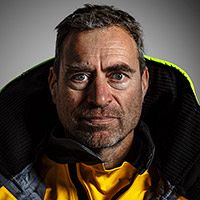Yesterday started with a bang.
Once again the tackline blew off the spinnaker and we had to do an emergency sail change. This time it was not due to gear failure, but instead to random chance. The spinnaker flogged briefly as we hit a wave at an unusual angle and the martin breaker (trip) line dropped underneath the bowsprit, pulling tight as the spinnaker reinflated and tripping the tack line! The chances of that occurring if one tried to make it happen are exceedingly small, but it never ceases to amaze me what can happen at sea.
Anyway, it turned out that it was a blessing in disguise as we needed to change from the Code 3 Spinnaker to the Code 2 to get ahead of GoToBermuda.
The new sail was quickly hoisted while the Code 3 was packed back into its bag by Ina Baum, Kath Haig, and Harriet McDonald. This expert team of bag packers have been named the Baguettes, and for their great work, I think they should be toasted.
Once we had the new sail set, we entered into a great day of match racing with GotoBermuda, sometimes being within shouting distance of each other. We had a lot of fun chasing each other all over the ocean. It probably didn't help our overall standings, but it did boost crew morale.
Towards sunset, the African coastline became clearly visible off our port bow as the wind began to back more towards the north. We put in a quick gybe as the wind shifted and took GoToBermuda by surprise, finally overtaking them as the sun dipped below the horizon. As the darkness set in, another light appeared to starboard. This turned out to be WTC Logistics, who passed close astern of us and then gybed onto our track. For some time, all three boats followed the same path through the night with no more than 5 nautical miles separating us. Great racing!
Still an hour and a half before sunrise and GotoBermuda and WTC Logistics have both gybed back towards the south. We will get in a little more west and then follow suit shortly.
During the course of yesterday we changed the clocks on board by two hours to reflect our new local time for this part of the ocean. Up until then, we had been running our daily routine on board according to British Summer Time, which is used in Portugal and the Canary Islands, despite the latter being so far west. Usually we change the clocks 1 hour for every 15 degrees that we move east or west, as the sun traverses 15 degrees every hour to complete 360 degrees in 24 hours. By this method of calculation, the Canary Islands should be one hour different from the UK and Portugal, because of their more westerly longitude, but they keep their clocks back to stay in time with western Europe. So now we have missed a whole time-zone and set our clocks to reflect the time that is used in the Cape Verde Islands, the next bit of land that we will be passing in a few days time.
Cheers,
Nick

